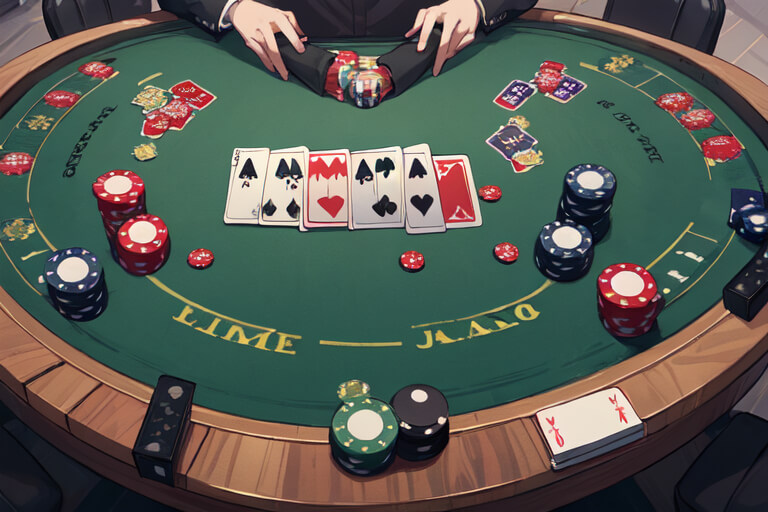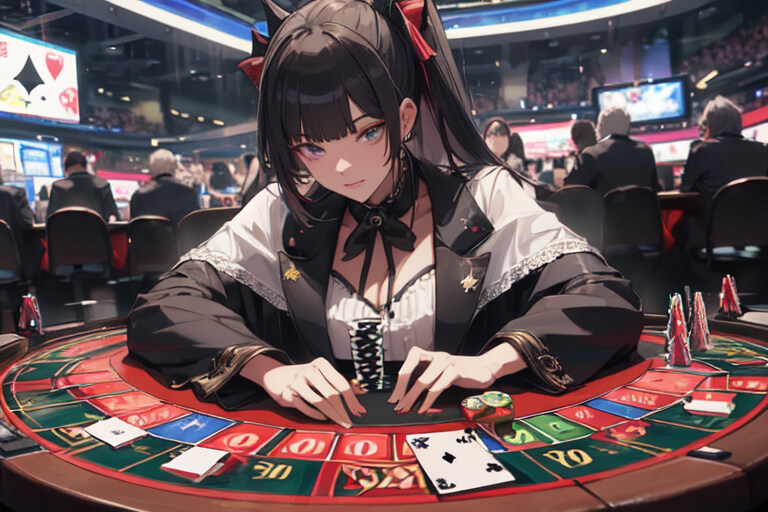Blackjack, also known as 21, is one of the most popular card games in casinos worldwide. Its combination of strategy, skill, and chance makes it appealing to both novice and experienced gamblers. While luck plays a significant role in card dealing, a solid understanding of the game rules, strategies, and tips can dramatically enhance your chances of winning. In this guide, we’ll walk you through everything you need to know to master Blackjack and improve your profit potential.
1. Understanding the Basics of Blackjack
Before diving into strategies and techniques, it’s essential to grasp the fundamental rules of Blackjack.
- Objective: The primary goal of Blackjack is to beat the dealer’s hand without exceeding a total value of 21. A hand that exceeds 21 is referred to as a “bust,” resulting in an automatic loss.
- Card Values:
- Number cards (2-10) are worth their face value.
- Face cards (Kings, Queens, Jacks) are worth 10 points each.
- Aces can be worth either 1 or 11 points, depending on what benefits the hand.
- Game Play: Each player is dealt two cards, and the dealer gets one card face up and one card face down. Players then decide whether to hit (draw another card), stand (end their turn), double down (double the bet and get one additional card), or split (if the two cards are of the same value, they can split them into two hands).
1.1 Betting Options
- Minimum and Maximum Bets: Most casinos set minimum and maximum betting limits at their tables, which players need to be aware of.
- Insurance: If the dealer’s face-up card is an Ace, players can place an insurance bet to protect against a dealer blackjack. This side bet pays 2:1 if the dealer has a blackjack but is generally not advisable due to poor odds.
2. Basic Strategy for Blackjack
Using a basic strategy is one of the most effective ways to reduce the house edge in Blackjack. This strategy is based on statistical probabilities and outlines the best actions based on the player’s hand and the dealer’s visible card.
2.1 When to Hit or Stand
- Hit: You should hit if your hand value is 11 or lower.
- Stand: If you have 17 or more, it is typically advisable to stand, especially if you have a “hard” 17 (a hand without an Ace).
- For hands valued at 12 to 16, players must consider the dealer’s upcard:
- If the dealer shows 2-6, it’s generally best to stand.
- If the dealer shows 7 or higher, hitting is usually the recommended action.
2.2 Doubling Down and Splitting
- Doubling Down: This is typically advised when you have a total of 10 or 11, as the chances of hitting a 10 or face card are higher.
- Splitting Pairs: If you’ve been dealt a pair, split them to form two separate hands:
- Always split Aces and 8s.
- Never split 10s or 5s.
- Split 2s, 3s, and 6s if the dealer shows 2-6.
2.3 Soft vs. Hard Hands
Soft Hands: A soft hand contains an Ace counted as 11. For instance, an Ace and a 6 is a soft 17.
- In soft hands, players can afford to take more risks since they cannot bust.
- Hit soft 17 or lower.
- Stand on soft 18 or higher.
Hard Hands: A hard hand lacks an Ace or has an Ace counted as 1.
- Be cautious with hard hands since they are more prone to busting.
3. Advanced Strategies
Once you’ve mastered the basic strategy, consider employing advanced techniques to further optimize your gameplay.
3.1 Card Counting
Card counting is a strategy that involves keeping track of the cards that have been dealt to gauge the remaining high or low-value cards. Although casinos are highly vigilant against card counters, understanding the basic principles can give you a competitive edge.
How to Count Cards:
- High Cards (10, J, Q, K, A): Assign a value of -1.
- Low Cards (2-6): Assign a value of +1.
- Neutral Cards (7-9): Assign a value of 0.
As cards are dealt, keep a running count. A higher positive count indicates a greater ratio of high cards left in the deck, favoring the player.
3.2 Betting Systems
Several betting systems exist, though each has its pros and cons. Here are two popular methods:
- Martingale System: This doubling strategy increases your bet after each loss, aiming to recover losses with one win. However, it demands a significant bankroll and carries the risk of substantial losses.
- Paroli System: The opposite of Martingale, this strategy involves increasing the bet after a win, allowing players to capitalize on winning streaks.
3.3 Setting Win and Loss Limits
Establishing win and loss limits is vital for maintaining control over your gambling experience.
- Win Limit: If you achieve your predetermined win limit during a session, consider cashing out.
- Loss Limit: Set a loss cap; if you reach it, leave the table and reassess your next steps.
4. Choosing the Right Blackjack Game
Not all Blackjack games are alike; selecting the right variation can significantly affect your overall success.
4.1 Common Variants
- European Blackjack: The dealer only receives one card initially and checks for blackjack before players act, slightly reducing the house edge.
- Atlantic City Blackjack: Offers favorable rules like the ability to surrender.
- Vegas Strip Blackjack: Features multiple decks but has appealing rules like late surrender.
Pay attention to specific house rules, such as doubling down after splits, surrender options, and the dealer’s standing on soft 17. These rules can greatly impact your strategy and profitability.
5. Psychological Aspects of Blackjack
The mental aspect of Blackjack can greatly influence your performance. Here are some strategies to enhance your mindset while playing:
5.1 Staying Calm and Focused
Emotions can easily skew your judgment, leading to poor decisions. Practice remaining calm and collected, especially during streaks of losses or wins.
5.2 Knowing When to Walk Away
Recognizing the signs of compulsion or frustration is vital. If you’re feeling overwhelmed, take a break or step away, regardless of your current game state.
5.3 Avoiding Alcohol and Distractions
Stay hydrated and alert by avoiding alcohol while playing, as it can impair your judgment. If you’re at a casino or playing online, eliminate distractions to maintain focus.
6. The Role of Lucky Charms and Superstitions
Many players believe in certain lucky charms or rituals before playing. While there is no scientific basis for luck in gambling, if these beliefs help build your confidence, they can positively impact your performance. Whether wearing a favorite shirt or following a specific routine, understanding that these beliefs may enhance your mental approach can be beneficial.
7. Playing Online vs. In-Person
While both formats have their benefits, there are key differences to consider:
7.1 Online Blackjack
- Convenience: Online Blackjack can be played from the comfort of your home and often offers various games.
- Bonuses and Promotions: Online casinos frequently provide bonuses that can enhance your bankroll.
- Pace of Play: Online games can progress rapidly, requiring quick decision-making.
7.2 In-Person Blackjack
- Social Interaction: Engaging with other players and dealers can enhance the gaming experience.
- Live Dealer Options: Online platforms now offer live dealer games, allowing players to experience the social aspect of Blackjack without leaving home.
- Less Pressure: Playing at your own pace can reduce the stress of dealing with a fast-paced online environment.

Conclusion
Blackjack is a game that beautifully marries strategy and chance. By mastering the basic rules, employing a solid strategy, and managing your bankroll effectively, you can significantly improve your odds of winning. Advanced techniques such as card counting and proper betting systems can further enhance your success.
Ultimately, the key to thriving in Blackjack is understanding the game, being disciplined in your approach, and enjoying the thrill of the table. Whether you’re playing in-person or online, remember that the primary objective is to have fun. Happy gaming, and may the odds be ever in your favor!
